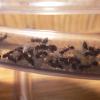Hello AntidepressAnt:
I'm glad to hear your colony is doing so well. A lot of what is written here is from a thread about maintaining large colonies located here How Hard is it to Maintain Massive Ant Colonies? - General Ant Keeping - Ants & Myrmecology Forum (formiculture.com) You should read it too for other people's opinions about things like Fluon etc,
Let me just say at the outset that if you want a barrier that is as close to 100% effective as you can get considering nothing is 100% escape proof when it comes to ants, then consider a physical barrier like screen as your final escape prevention measure. I have found a cheap source of excellent screen at the dollar store. I use the splatter screens for frying pans and cut the screen to size with heavy scissors. I use hot glue to stick it in place. It doesn't rust and has a tighter weave than mosquito screen and I use it exclusively for my Camponotus colonies.
As far as oil barriers are concerned, I have only developed what I consider to be foolproof escape barriers for Camponotus and Tapinoma ants (using mineral oil and talcum powder), so they're the only two types I keep in open top containers. All the rest of my colonies are kept in containers that have tight fitting lids and stainless-steel screens over holes for ventilation. This becomes important as the larger a colony becomes, the more persistent and determined they become. There can be very large numbers of very determined ants. With larger colonies, escape must be as impossible as you can make it. They will put debris on Vaseline until they've made a bridge they can walk over; they'll try to get over talcum powder barriers relentlessly until they've worn it away and can finally climb out. They'll skate over Fluon and they'll chew on screens and glue or anything else that might afford the chance for escape. This means that as colonies grow larger, reapplication of barriers and regular inspections become more important to stop escapes before they happen.
Try using "heavy mineral oil" as a barrier in your outworlds. It's available at your pharmacy. I use it as a barrier for all my ants and so far, only Lasius americanus and Temnothorax ants have been able to easily cross it. Most of my ants, especially Tapinoma, stop dead when they reach it. I use a cotton swab to apply it in a narrow strip around the area I don't want the ants to cross. I put it around screens and feeding ports to keep ants out, but here's a little tip. Don't put it at the top of the walls you don't want them to climb. Put it all around the bottom of the walls. I find that a 1/4-to-1/2-inch (1-2 cm) strip is all it takes. I started doing this because mineral oil is thin (even the heavy oil) and it will run if I put it at the top. Putting it at the bottom eliminates that problem with the added bonus that any adventurous ant that does cross it will have nicely oiled "feet" and will find it impossible to climb up the smooth acrylic wall. This stops wall climbing right from the outset and often, they just stop trying. I find the trick to making a heavy mineral oil or Vaseline barrier most effective is to take my finger after the oil has been applied and simply touch my finger to it and lift my finger off. I do this all the way around. This seems to spread it more evenly and prevents it from running as much, plus it seems to make the Vaseline a much more difficult barrier to cross. And if they're real escape artists you can add a second barrier at the top. Talcum powder sticks really well to oily feet and they fall off every time.
To make a powder barrier I apply a thin, narrow band of mineral oil or Vaseline at the top of the walls, and then I use a cotton ball dipped in dry powder (I use 50 year old "Johnson's Baby Powder" with the baby fresh scent and I have no idea what's in it) and I gently dab the powder onto the oil. I redip the cotton ball in the powder many times because I try to apply a layer of loose powder evenly onto the oil. That loose powder comes off on the feet of any ants that try to cross it. A small piece of cardboard held under the cotton ball catches any loose powder that falls into the outworld, or I just blow it out after I'm done. Camponotus ants climb glass and acrylic walls very poorly. I find the combination of heavy mineral oil at the bottom of the wall and oil and powder barrier at the top, works very effectively to contain mine.
I just finished taking all the colonies where I use an oil and powder barrier, out of winter storage, totally cleaned off all the old barrier and reapplied fresh barrier for spring. I usually reapply powder once in the middle of summer and spot repair any time if there's an area that doesn't look white or if there's an area where ants have worn away the oil or powder by repeated attempts to climb one particular area. Constant monitoring is required. Good Luck
RPT
Edited by rptraut, March 16 2024 - 11:23 PM.
My father always said I had ants in my pants.


















